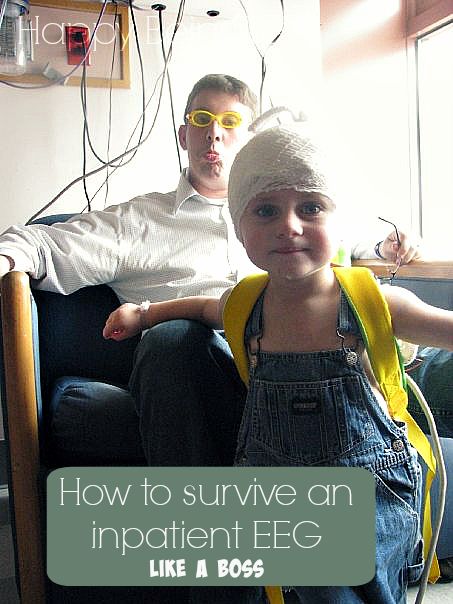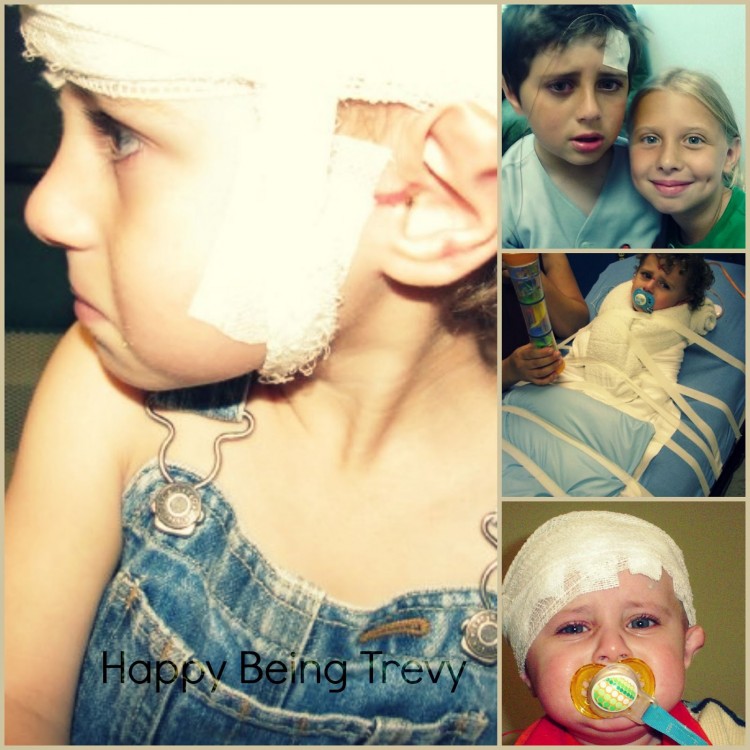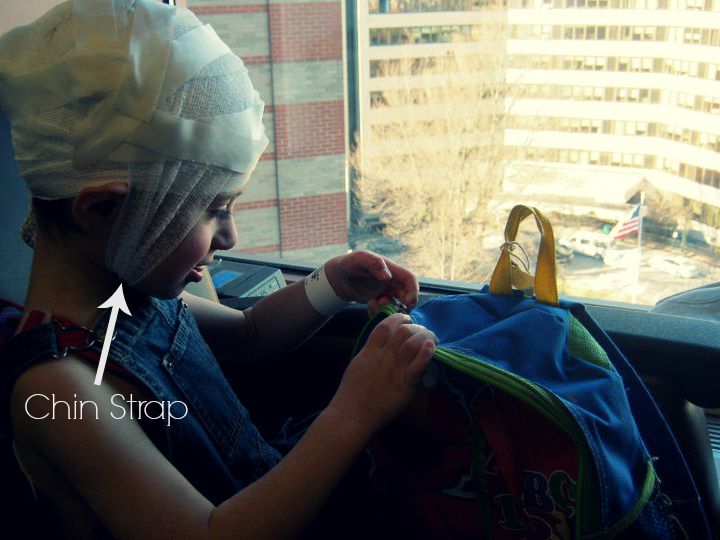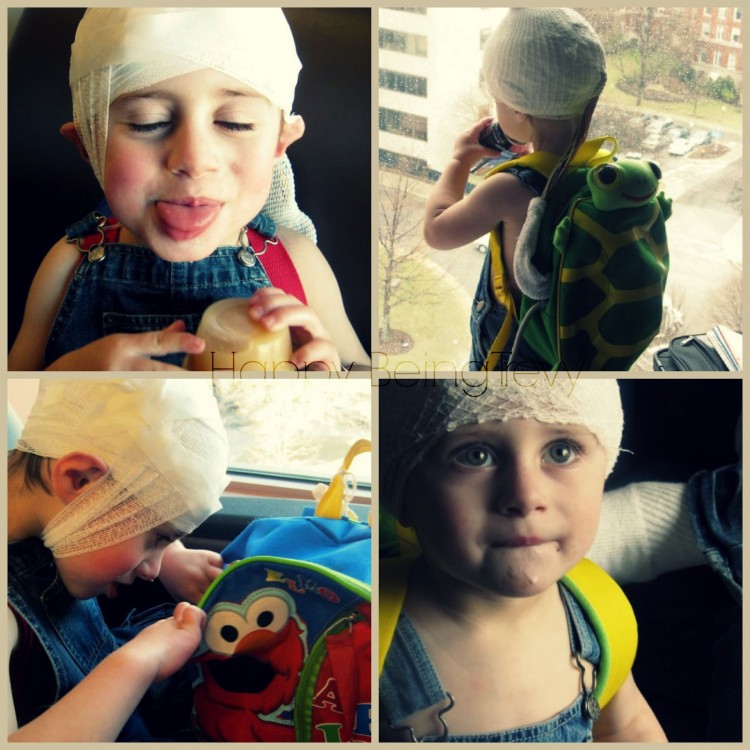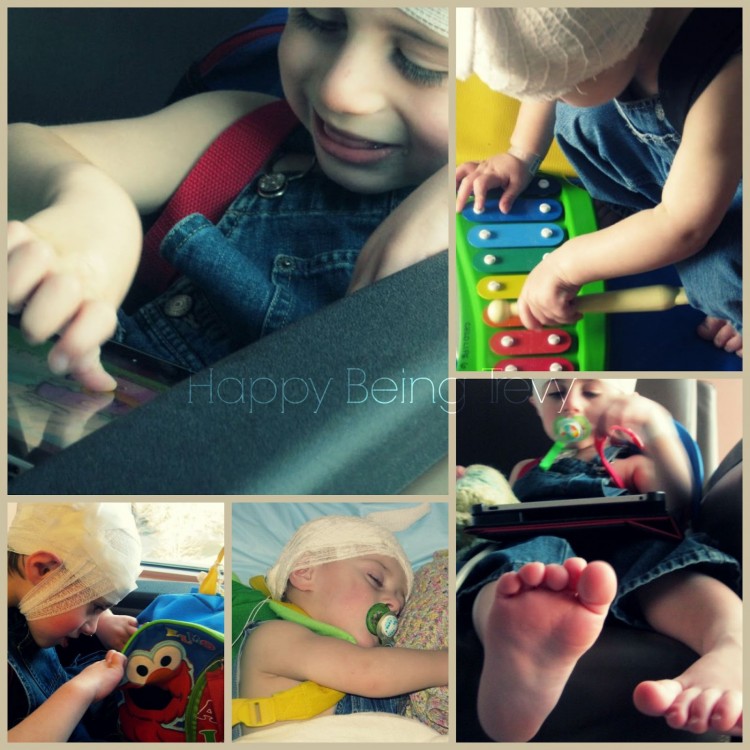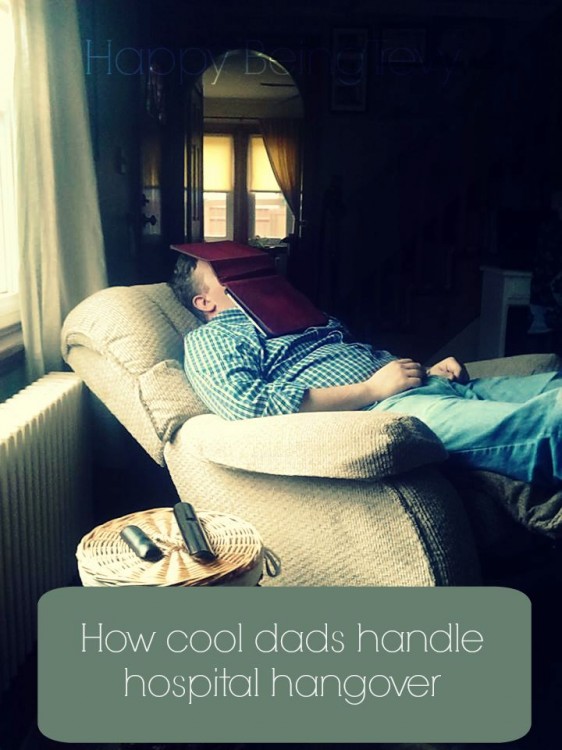How to Survive an Inpatient EEG (Like a Boss)
So, confession.
We don’t do anything like a boss around here. We’re not that cool.
Also, I don’t typically write advice posts. I suppose that’s because I consider myself more learner, less teacher. Or maybe it’s just that know-it-all types drive me wonky? At any rate, after surviving yet another inpatient EEG, my hubby and I thought it’d be akin to sin not to share some things we’ve learned over the past eight years. This is in no way an exhaustive list. Nor do I claim to be an expert. It’s just my list. My credentials being that I happen to love a little guy living with severe epilepsy. Believe me when I say, we’ve been around the inpatient EEG block.
Other relevant stories:
• Can a Woman with Epilepsy Have a Baby
• Medications for Epilepsy
• Things You Can’t Do with Epilepsy
1. Be Prepared to Wait
Unless you’re one of those people who should totally play the lotto because things just always fall your way, you can expect to wait. On the front and back ends of your hospital admission. We’ve had the joy of visiting four rather large children’s hospitals (Boston, Detroit, Providence, Orlando), and one thing we’ve learned is that admissions are, as a general rule, a pain in the you know what. Gotta love bureaucracy. It never fails. No matter how many months in advance we’ve booked our overnight EEG, no matter how many reminder notices we’ve received in the mail, when we arrive at admissions everyone seems shocked that we actually showed. We’ve waited upwards of five hours for a “bed to open.”
The only thing worse than waiting for a bed is waiting to escape it. The discharge process is a form of cruel and unusual punishment! When the attending gives you the go-home green light (usually during early morning rounds) you’re giddy with joy. Oh, the sweet smell of freedom! You’re mentally imagining yourself munching a relaxing brunch on your own couch. Taking a long, stress-detoxing shower and getting in your jammies all by noon. But no one else seems to be in much of a hurry to let you out, and it’s absolute torture, I tell you. I’ve tried all the techniques too. Begging, pleading, befriending nurses, firm I-mean-business conversations. But at the end of the day, bureaucracy moves like molasses. And if you’re a control freak like me, it’ll save you so much stress if you just go prepared to wait.
2. Hooking Up = Unhappy Camper (and Staying Hooked Up Ain’t Any Better)
If you’re coming in for an overnight EEG chances are your child has already been EEG-ed before. You probably know the drill. For those who might be first timers here is a great social story that shows you (and your child) what to expect. Keep in mind, I see everything through the filter of life with my son Trevy. His first EEG was at 7 months old, and he’s had at least one each year since. I thought it would get easier. Yeah, for us, not so much — although he’s matured to a place where he’s more easily comforted with words and social stories. I find that siblings are also an awesome resource. Still, you can expect some tears and fears. I know it’s not easy for me. I can only imagine how scary and intense it feels for him.
Be sure to have your child wear clothing that doesn’t need to be pulled off over their head. Otherwise, once you’re hooked up… you’re stuck. I love the shirtless overalls look because it makes for adorable pictures. Zippered sweatshirts and button down jammies are other faves for us.
Don’t be embarrassed if your child rips everything off and you have to call the techs to schlep back over and re-wire him. Something about being mummified and imprisoned brings out the Donnie from “The Wild Thornberries” in Trevor too! Oh, and two words for ya – chin strap!
As much as I gripe about our local hospital, at least they have someone to monitor him through the night so we can sleep. We’ve been to some facilities which require a guardian to stay awake all night long. You’ll have to flip a coin or arm wrestle to figure out who wins that honor! Actually, I usually take the day shift (so Hubster can go to work) and we swap for night duty. I married a good man.
3. Press That Button
Where the hooking up happens varies from hospital to hospital. We’ve been hooked up in different wings and then transferred (through super fun secret hallways) to our room. We’ve also been hooked up right in the room. Either way, after you’re glued, wrapped and settled in your room, it’s time to get down to business. There will be a camera, which should be on your child at all times. You may have to manually control the camera yourself. We find this easier because it allows him more freedom to move. Some hospitals have staff at the controls and require your child to stay in a designated area (think pack-n-play size) so they’re always center stage. We like to bring our own mini backpack to put the portable machine in, but most hospitals have their own as well. There will be a cord with a handle. On the handle lives the magic button. You will be told to press that button any time you see “an event.” Do not be afraid to push that button! Any and every thing that makes you worry is a reason to push the button. It’s so, so, so important to push that button. The button helps the neuros (or epileptologists) read the EEG data by marking a few minutes before and a few minutes after you pushed it. The easier it is to read the EEG, the sooner you get to go home. And the sooner your heart can digest whatever information comes from the report. Also, do you really wanna do this all again?
I didn’t think so… so… PRESS THAT BUTTON.
Been There Done That Hint: Most of video monitoring systems also record audio. So if you’re gonna (and trust me, you will) have a blow out with your spouse, I suggest doing so in whispers or code!
4. Bring Your Own Meds
Seriously. If your child takes seizure meds bring them with you. Some of the most stressful moments during inpatient stays have been over meds. It boggles my mind how doctors can be so flippant about seizure medication orders, but we’ve literally given Trevor’s 7 p.m. dose as late as 11 p.m. After a crazy-mommy meltdown moment, we decided to start bringing our own. It is so much more peaceful to administer meds on time.
5. Make Yourself at Home
You’re gonna be there for at least 24 hours (possibly longer) so you might as well feel comfy. Ask the nurses to show you where to find clean bedding, pillows, towels, etc. Not only will you enjoy feeling more independent, they’ll appreciate not having to run to your room every time you need a washcloth.
Our local hospital has a Ronald McDonald House room which provides coffee and snacks for parents staying in the hospital. A coffee cart comes by in the mornings too. Ask the staff about what your hospital might offer.
If your child is out of a crib and in a big kid bed be sure to ask for padded siding. Not only will it make the bed more comfy cozy, it will also cover up the bed control buttons. Out of sight – out of mind!
6. Pack Favorite Snacks
Hospital food isn’t always groady, but when you’re craving an Oreo, you’re craving an Oreo.
7. Distract-ify
See above – because yummy snacks are a great distraction. But some other things that have helped us navigate the hoooooooours of being trapped in a cell hospital room:
- Child Life – many (if not all) children’s hospitals have Child Life programs which exist to help make your child’s stay more comfy by providing toys, books, coloring pages, movies, video games and sometimes even super cool things like music or animal therapies. Use them. In fact, ask for them to visit as soon as you meet your nurse.
- iPad/Pods/Phones (you get the idea) – load it up with new apps (I post freebie apps here and have a list of our faves here). Some of our can’t live withouts are: Netflix, Pandora, FaceTime and YouTube. I love our iGizmos because they’re small and easy to pack which means I don’t have to bring everything plus the kitchen sink with me.
- Comfy Faves – I know he’s 8, and I should totally be weaning the binky more aggressively… but during an inpatient EEG it’s all about making him feel safe and comfy. I packed an arsenal of binkies and blankies. Whatever things comfort your little one, be sure to bring them.
- Visitors – if you have friends/family in the area, ask them to visit. I even asked if Trevy’s home-based therapy could be done at the hospital, and guess what? They said yes!
- Virtual Visitors – FaceTime is so wonderful! Trevy was able to see and chat with his brother, sister and Grams on our iPod.
8. Prepare Yourself for the Hospital Hangover
If at all possible, try to take (at least) the day following your discharge off to recoup. Even if nothing super dramatic happens during your stay, there’s just something emotionally, physically and spiritually draining about spending the night in a children’s hospital. And it will hit you (probably your whole family) like a ton of bricks. You’ll feel like you’re slogging through mud for days afterwards. My hubby and I affectionately refer to this phenomenon as Hospital Hangover. Be ready for it. Plan to spend a day or so decompressing in jammies and Netflix marathons.
Again, this is in no way an exhaustive list of ideas… it’s just our list. Filtered through our life with Trevy and his epilepsy journey. If you have an overnight EEG in the works, hopefully some of these tips will help make it more bearable for your family.
This post originally appeared on Happy Being Trevy.
Do you have a story about your experience with epilepsy? Please send it to epilepsy@themighty.com and include a photo for the story, a photo of yourself and a 1-2 sentence bio. Check out our “Share Your Story” page for more about our submission guidelines.

